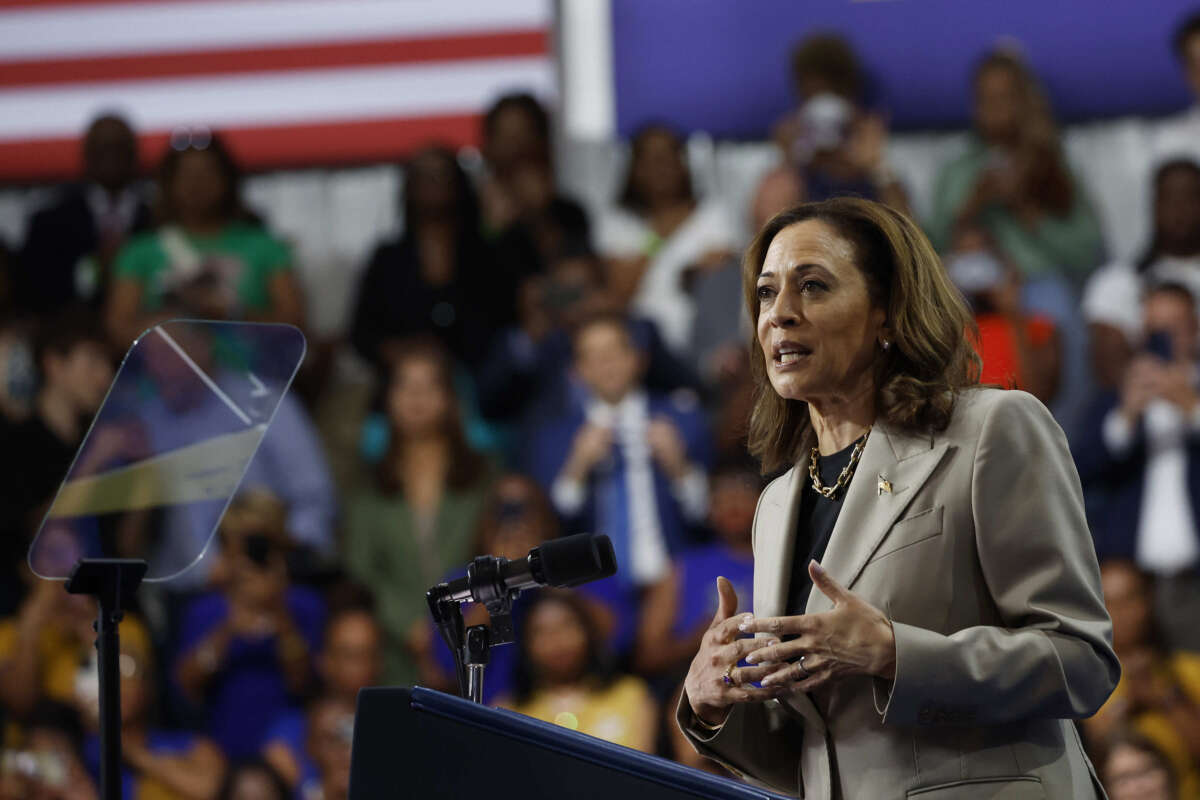Truthout is a vital news source and a living history of political struggle. If you think our work is valuable, support us with a donation of any size.
Democratic presidential nominee Kamala Harris on Friday is set to outline a four-year housing plan that would promote the construction of 3 million new housing units, provide substantial down-payment aid to first-time homebuyers, and strip away tax incentives for corporate investors that purchase single-family homes and drive up prices to pad their bottom lines.
Harris’ proposals to tackle the nation’s worsening housing crisis are part of a broader economic agenda that the vice president will lay out in a speech Friday afternoon in North Carolina.
Harris, who recently pledged to “take on corporate landlords and cap unfair rent increases,” is expected to urge Congress to pass a pair of bills that would crack down on algorithmic price-setting by big landlords and bar corporate investors who buy up 50 or more single-family rental homes from taking advantage of tax breaks, building on President Joe Biden’s push for corporate landlords to cap rent hikes.
A recent report by the Government Accountability Office (GAO) found that just 32 institutional investors owned a combined 450,000 single-family homes in the U.S. and the five largest investors owned nearly 300,000 homes. Institutional investors control 25% of the single-family rental housing market in Atlanta, Georgia, according to the GAO.
Another major component of Harris’ housing plan calls for providing up to $25,000 in down-payment assistance to “working families who have paid their rent on time for two years and are buying their first home.”
Harris’ campaign said the plan would “expand the reach of down-payment assistance, allowing over 4 million first-time buyers over four years to get significant down-payment assistance.”
“Trump likes to talk about being a builder, but when he was president, he simply never got it done. Now, his Project 2025 agenda will make it more expensive to rent or buy a home,” the Harris campaign said Thursday. “Year after year during his presidency, Trump tried to gut rental assistance programs. New home construction slowed while Trump was in office — tightening the housing crunch and enabling his wealthy friends to profit.”
Harris campaign releases four-year housing plan aimed at lowering housing costs and ending housing shortage:
— Joey Garrison (@joeygarrison) August 15, 2024
1. Calling for the Construction of 3 Million New Housing Units
2. Taking on Corporate and Major Landlords
3. $25,000 Down-Payment Support for First-Time Homeowners pic.twitter.com/wfAiXvdgjB
Housing justice advocates applauded the emerging details of Harris’ plan, arguing that persistent tenant organizing has helped elevate the hardships of renters to the top of the Democratic Party’s priority list for 2024 and beyond.
“How did these get on the agenda? Organized renters making good trouble,” the Alliance for Housing Justice wrote on social media.
In recent months, progressives and tenant organizers have worked to make housing central to the 2024 campaign as renters across the U.S. struggle to make their monthly payments and as sky-high prices, elevated interest rates, and supply shortages box out first-time homebuyers. Housing costs accounted for roughly 90% of the overall increase in the Consumer Price Index last month, according to the Bureau of Labor Statistics.
A recent research brief by Russell Weaver of Cornell University stressed that tenants impacted by the nation’s housing affordability crisis are a “large, untapped political base — especially for Democrats and progressives.”
“Candidates who campaign on housing affordability and tenant protections have the potential to significantly boost renter turnout, which could be decisive in tightly contested races,” Weaver said.
A terrifying moment. We appeal for your support.
In the last weeks, we have witnessed an authoritarian assault on communities in Minnesota and across the nation.
The need for truthful, grassroots reporting is urgent at this cataclysmic historical moment. Yet, Trump-aligned billionaires and other allies have taken over many legacy media outlets — the culmination of a decades-long campaign to place control of the narrative into the hands of the political right.
We refuse to let Trump’s blatant propaganda machine go unchecked. Untethered to corporate ownership or advertisers, Truthout remains fearless in our reporting and our determination to use journalism as a tool for justice.
But we need your help just to fund our basic expenses. Over 80 percent of Truthout’s funding comes from small individual donations from our community of readers, and over a third of our total budget is supported by recurring monthly donors.
Truthout has launched a fundraiser to add 500 new monthly donors in the next 9 days. Whether you can make a small monthly donation or a larger one-time gift, Truthout only works with your support.
